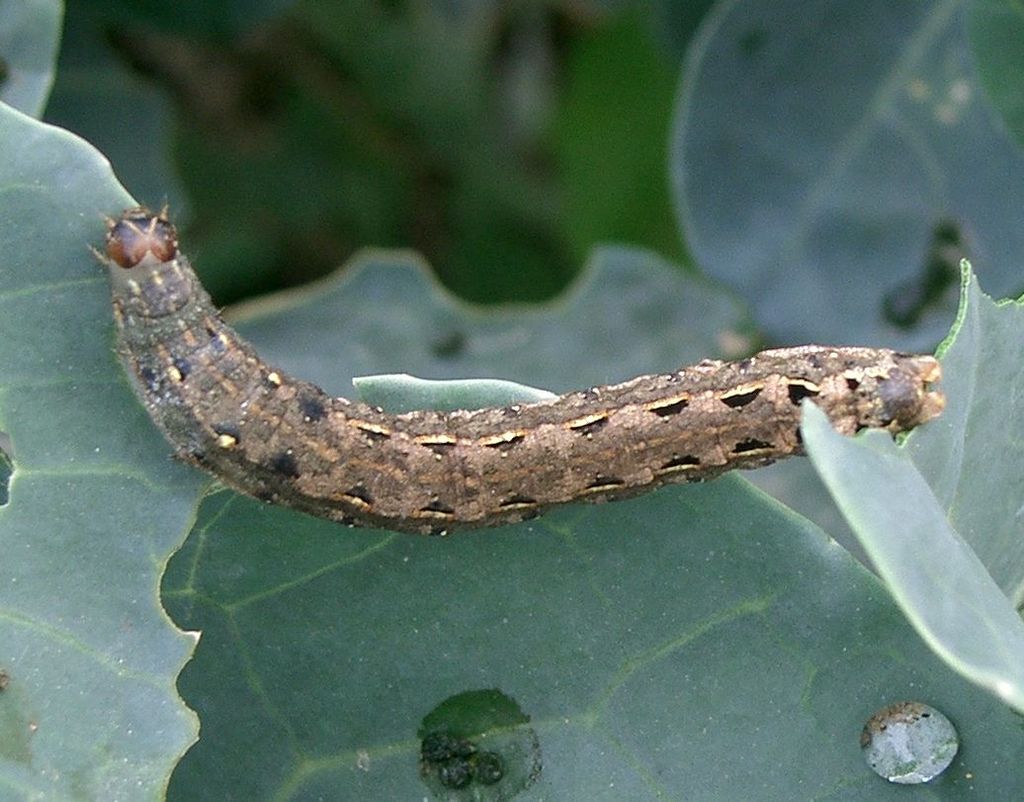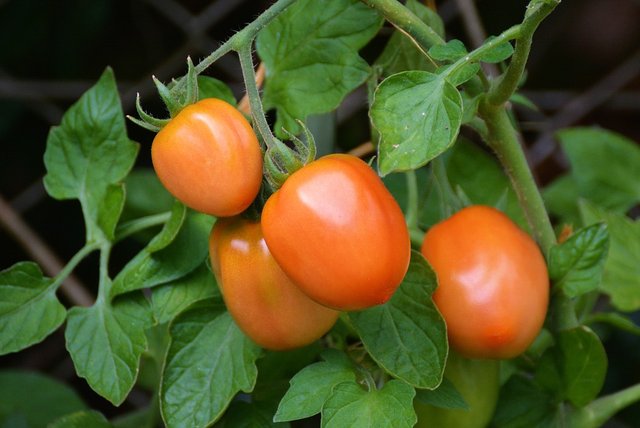About the amazing mechanism how infested tomato plants help uninfested ones to defend against 'common cutworms'.
Plants communicate, cooperate and even have the ability to learn.
During the last years it has become more and more obvious on how many fascinating ways plants are able to communicate with each other, whereby this communication is even possible between different species and actually some of the volatile organic compounds emitted by the leaves have the function to 'call' animals (for example wasps) to defend the plants against their enemies (for example aphids). R. Krulwich describes various examples of how plants are communicating in a very easy to read and entertaining way on his website.[1]
At this point I also would like to recommend everybody who is interested to learn more about astonishing abilities of plants to read a Steemit article from @justtryme90 in which he presents a study about learning capabilities of plants[2], and another one about an amazing cooperation between plants and fungi.[3]
Tomato plants attacked by insects not only warn conspecifics, but in addition their signals deliver molecules which the receiving plants can convert into weapons to defend themselves!
Today I focus on only one, but rather interesting example of plant communication respectively cooperation.
Tomato plants which are attacked by larvae of Spodoptera litura[4] ('common cutworms') release chemical signals containing various volatile organic compounds (VOCs).
The attacker, larvae of Spodoptera litura ...

Kenji Matsui and colleagues from Yamaguchi University found out that in a constant airflow system under laboratory conditions leaves of tomato plants growing downwind of plants purposely infested with cutworms contained a higher concentration of the glycoside (Z)-3-hexenylvicianoside (HexVic) than normal uninfested plants. Similar results were achieved in an experimental field.[5]
Why is that of any importance? Well, HexVic is a defensive compound which slows down weight gain of the cutworms and thus reduces their survival chances.
At first Matsui assumed the uninfested tomato plants just would detect the signals of the infested ones and then start to synthesize HexVic to be able to defend themselves against the approximating danger: "We expected that volatiles made the receiving plants more defensive through activating a signal pathway". This kind of communication between plants would be amazing enough, but there is even more ...
... the VOC signals of the infested plants not only activate the receivers to synthesize their defensive compound, but in addition already contain (Z)-Hex-3-en-1-ol[6] (lets just call it (Z)-3-hexenol from now on), a parent substance for the production of HexVic.
The defender ...

How to prove that the plants really make use of the delivered (Z)-3-hexenol?
But how could the scientists be sure that the pest-free plants really used the (Z)-3-hexenol delivered by the infested ones to build HexVic? It could also be that they synthesized it without using the component sent by their conspecifcs ...
The solution was to mark (Z)-3-hexenol with deuterium, 2H (a 'heavy' hydrogen isotope whose nucleus contains beside a proton an additional neutron),[7] and then spraying it onto the plants. The later produced HexVic contained the deuterium, as well, which was the proof that absorbed (Z)-3-hexenol (rather than (Z)-3-hexenol already stored within the plant) is utilized by the leaves of the tomato plants to synthesize HexVic.[8]
The scientists found already other HexVic producing plants like sorghum and rice which might use similar mechanisms to defend themselves. The next step would be to isolate genes involved in the glycosylation of (Z)-3-hexenol, and use them in agriculture to protect tomato plants and other crops.
Sources:
- http://www.radiolab.org/story/plants-talk-plants-listen/
- https://steemit.com/science/@justtryme90/plants-can-learn-from-experiences-yes-you-read-that-correctly
- https://steemit.com/science/@justtryme90/carbon-for-nitrogen-please-say-the-trees-to-the-fungus-sure-thing-say-the-fungi-but-pay-no-mind-to-the-insect-corpses
- https://en.wikipedia.org/wiki/Spodoptera_litura
- http://www.pnas.org/content/111/19/7144
- https://en.wikipedia.org/wiki/Cis-3-Hexen-1-ol
- https://en.wikipedia.org/wiki/Deuterium
- https://www.chemistryworld.com/news/tomatoes-cry-for-help-turned-into-chemical-weapon-to-battle-insects/7308.article
The more I read about things you write in your articles, the more I realize that there are soooo many things that I don't know. Plants communicate and cooperate? That's something I've never imagined :D
I am glad to hear that you actually can learn anything by reading my articles! :)
That is for sure, @jaki01. I love reading your articles like these and of course your travel stories. But to be honest I don't understand the ones about chess :D
Interesting how the whole ecosystem works and every part of it has its own function and purpose.
Maybe the plants will rule the world some day? just kidding ;-P
Thanks also for the reference sources!
Liebe Grüße aus der Pfalz :)
In a certain way plants do rule the world: we are depending both on their released O2 (while fixing CO2) and on the organic molecules (like glucose) they are producing on the basis of anorganic matter by doing photosynthesis. That means without plants we just couldn't exist. They can exist very well without us, though. :)
By the way, in case you liked my article, then don't worry: I will not forbid you to upvote it. :)
Yeah you're right with your thoughts.
That's why it's all the sadder that in many regions the woods get cleared..
And in the same second there are more and more cars on the streets or other exhaust gas pollution.
Oh I'm sorry, I thought I already upvoted your post. Now it's there!
Also I follow your blog :)
Thanks a lot! :)
Interesting information! It’s really amazing that tomato plants can help other plants to defend against cutworms. I haven’t heard about this before. Thanks so much for sharing! ;)
Super-interessanter Artikel! Wer hätte das von Tomatenpflanzen gedacht...
Wow, fascinating! Things I didn't know! But I don't see the point in then GMOing the plants to do what they're already doing. The world is finding out that GMOing plants is a vector for those scientists with malicious intentions to weaponize the food supply. Instead, we can use plants' native abilities to improve and expand our organic farming & gardening.
I am a supporter of organic farming & gardening, too, but at least extracted genes which could produce defense compounds in laboratories are different from poisonous chemicals: the end product would still be natural. There should be some testing though to be sure that it only affects the 'cutworms' and not at the same time bees, bumblebees or butterflies ...
Hello @jaki01,
Extraordinary good article about unknown information about this bravest plant.
~@mywhale
Very cool article. Who knew that plants communicate with each other? This reminded me about something I read about a while ago about a defense mechanism that bacteria use to protect the colony. I tried searching for it, but so far no luck. However, I did find another interesting behavior of our old friend, the tomato plant ...
When under attack by caterpillars, tomato plants release the chemical methyl jasmonate. This gives the tomato leaves an unpleasant taste, so the caterpillars (hungry as they are) start eating each other. Basically, the plant capitalizes on a trait of these nasty little beasts: when food is scarce, they turn into cannibals! And just as we saw in your research, @jaki01, the release of methyl jasmonate is a signal to neighboring tomato plants to take the same defensive measure.
http://blogs.discovermagazine.com/d-brief/2017/07/10/cannibal-caterpillars-tomato-plants/#.WglGzVtSxaQ
I have new-found respect for tomato plants. :)
Amazing! In particular how one plant somehow sacrifies itself to save the others!
Amazing how nature is able to adjust to the circumstances.
Shared with my followers.
Vielen Dank! :)
Huh whats up now? My eyes must be misleading me. Jaki you are obviously a man of many talents :) didn't think of you when taking a look into the science corner but well that's now a given :)
Nice article nice tomato:)
Impressive
I am like a 'sleeping' virus so that many weeks or even months you can't detect any scientific activity on Steemit, but suddenly seemingly without any real reason the true nature comes to light. Then, after a while the virus will hide again and continue to 'sleep'. :)